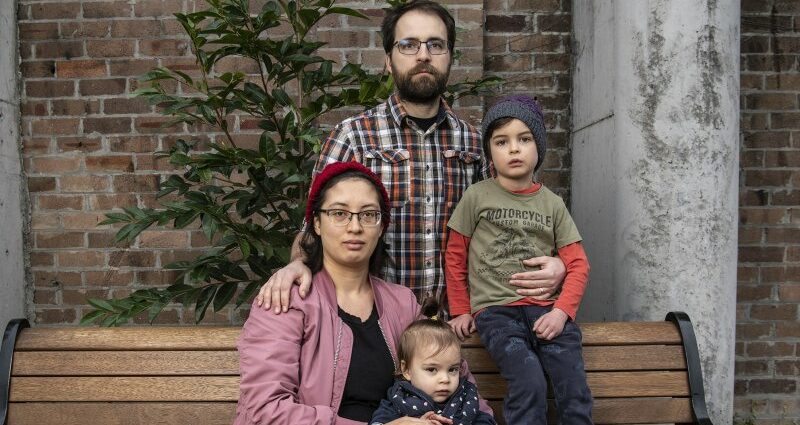Save articles for later
Add articles to your saved list and come back to them any time.
Women who have suffered trauma during pregnancy and childbirth will give evidence to an upper house inquiry sparked by a group of mothers who complained about their treatment at a regional NSW hospital.
The NSW Health Care Complaints Commission (HCCC) is investigating the maternity care 30 women received at Wagga Wagga Base Hospital, including allegations they were not given adequate pain relief, others were forcibly held down, and some were told they would be induced into labour to free up hospital beds.
Eddy Mead lodged a complaint with the Health Care Complaints Commission after a traumatic caesarean while giving birth to her son, Taylor (right). Credit: Steven Siewert
The problem is not confined to one hospital, with 1 in 10 women in Australia saying they were made to feel abused, powerless or dehumanised by a healthcare provider in the last five years.
Animal Justice MLC Emma Hurst will chair the upper house select committee into preventing birth trauma in NSW, which will hear from mothers, academics, and healthcare providers before reporting on its findings in February next year.
Hurst said the inquiry was the first of its kind in Australia and would focus on investigating and preventing cases where maternity care providers had compounded or contributed to trauma.
“What we’re talking about is avoidable trauma,” she said. “We’re talking about physical and psychological consequences, but also where women are feeling confused and disempowered.”
“What we’re talking about is avoidable trauma.” Animal Justice Party MLC Emma Hurst will chair the upper house inquiry.Credit: Janie Barrett.
Eddy Mead wanted to give birth to her son Taylor naturally, with as few interventions as possible. Instead, her obstetrician at the Mater Hospital in North Sydney decided she needed to be induced and, when that failed to bring on labour, she was forced to undergo an emergency caesarean late at night.
She signed a consent form but said she did not give proper consent because nobody told her why the procedure was necessary, its risks or its benefits. She ultimately filed a complaint with the HCCC and received an apology from the Mater 18 months later.
“If they’d sat down and had a conversation at each point, then the exact same events could have happened and it would not have been traumatic,” she said. “But the fact that I felt like I had no say … that’s the crux of it – the failure to take in my perspective.”
Mead said she supported the inquiry and looked forward to sharing her experience.
In a survey of more than 8000 women across Australia, 10 per cent said they were made to feel abused, powerless or dehumanised by a healthcare provider before, during or after childbirth, treatment that amounts to “obstetric violence”.
“It is everywhere … it’s happening in metropolitan areas as well,” said Dr Hazel Keedle, a senior lecturer in midwifery at Western Sydney University who led the study. “This should be such an important time of their life, to become strong, confident mothers. They should not be having to endure obstetric violence as well.”
Keedle said the inquiry would give women an opportunity to share their stories, while also hearing from healthcare providers on ways to improve the system.
“Nobody goes into this profession with the thought of doing harm, and nor did the professionals that are working right now,” she said. “But we can look at the whole system – where there is lack of staffing, where there is lack of support, and where there is a medicalised model pushing for more and more interventions – which might not be the experience that women are really wanting.”
In response to questions from the Herald, the body in charge of running the Wagga Wagga Base Hospital – the Murrumbidgee Local Health District – apologised to patients, and said it had appointed a clinical director of obstetrics and gynaecology to help oversee a transition towards “a women-centred model of care”.
Health Minister Ryan Park said the complaints raised by women about the hospital were concerning and expressed his support for the parliamentary inquiry.
“I commend Emma Hurst MLC for her advocacy on this important issue and support the establishment of an inquiry into birth trauma,” he said.
The Morning Edition newsletter is our guide to the day’s most important and interesting stories, analysis and insights. Sign up here.
Most Viewed in National
From our partners
Source: Read Full Article
-
Widow finds husband's grave after returning to Ukrainian city
-
Second pilot axed from Red Arrows in shame, disgracing Armed Forces
-
Elon Musk warns Nuclear war chance rising rapidly responding to Mad Max theory
-
Putin could provoke ‘another war in Europe’ as tensions brew in the Balkans
-
Water firms planning new price rises for customers, Ofwat chief warns



